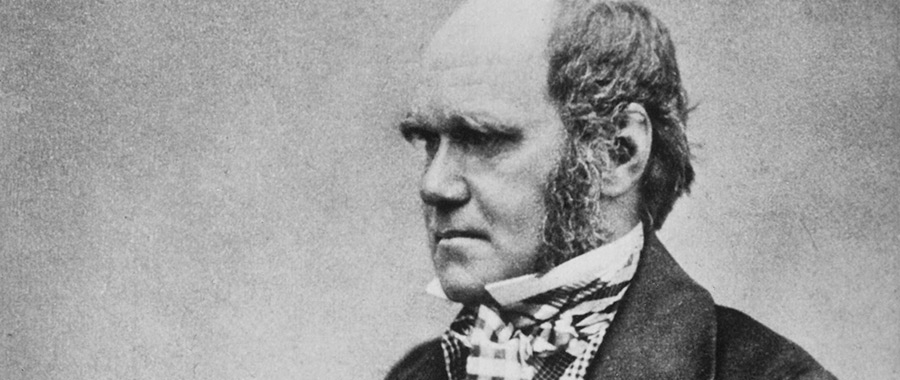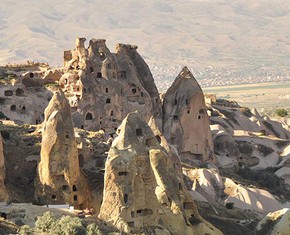The views expressed in our content reflect individual perspectives and do not represent the authoritative views of the Baha'i Faith.
Most people remember Charles Darwin, a leading scientist of his time, for his theory of the “survival of the fittest.”
This is a view of evolution that pits one creature of the natural world, including humans, against the other, in an inherent opposition between all creatures. Some even say his theory initiated a worldview characterized by separation and competition.
However, if we dig deeper into his writings, we find another side to this story—one that is unknown, overlooked or at best misunderstood. A worldview characterized by separation had been around for many centuries before Darwin, and many of his followers’ attempts to promote his theory now seem like a last gasp attempt to hold on to this outmoded way of seeing the world. Also, Darwin’s full theory, upon closer examination, aligns more with the emerging spiritual principles of his time than we were ever led to believe.
During Darwin’s lifetime, a leap in humanity’s consciousness began to take place in 1852 with the release of the sacred writings of Baha’u’llah, the founder of the Baha’i Faith. The Baha’i teachings, meant to move beyond the prevailing norms of nation-building and nationalism, are instead founded upon the oneness of humanity—the primary spiritual principle characterizing our time:
The earth is but one country and mankind its citizens. … Ye are the fruits of one tree, and the leaves of one branch … So powerful is the light of unity that it can illuminate the whole earth. – Baha’u’llah, Gleanings from the Writings of Baha’u’llah, pp. 250, 288.
The Baha’i teachings offer a fully developed view of evolution in which all things are interconnected, are dependent upon the same Creator, and therefore follow the same laws and principles in all realms— including humanity’s collective evolution, which goes through stages, as does the individual:
Reality is one; and when found, it will unify all mankind. … Reality is the knowledge of God. … Reality underlies all the great religious systems of the world. – Abdu’l-Baha, The Promulgation of Universal Peace, p. 372.
World order can be founded only on an unshakeable consciousness of the oneness of mankind … Recognition of this truth requires abandonment of prejudice—prejudice of every kind—race, class, colour, creed, nation, sex, degree of material civilization, everything which enables people to consider themselves superior to others. – The Universal House of Justice, The Promise of World Peace, p. 10.
The Baha’i teachings uphold evolution as purposeful, progressive, and leading to larger and larger circles of cooperation. Darwin’s view of evolution, when seen in its entirety, perhaps surprisingly, parallels this perfectly. Not only did he attend divinity school before he set out on his life changing—and paradigm changing—voyages on the Beagle to the remotest parts of the world, but he also recognized that co-existing with his theory of “the survival of the fittest” is the natural law of cooperation.
A closer look at Darwin’s views reveals an intriguing connection between his evolutionary theory and the Baha’i teachings. Buried within Darwin’s The Descent of Man (1871) is this gem of progressive evolution:
As man advances in civilization, and small tribes are united into larger communities, the simplest reason would tell each individual that he ought to extend his social instincts and sympathies to all members of the same nation, though personally unknown to him. This point being once reached, there is only an artificial barrier to prevent his sympathies extending to the men of all nations and races. – Charles Darwin, The Descent of Man, p. 83.
What is he expressing here, if not collective altruism, or the Golden Rule writ large? In one sweeping statement, Darwin takes the natural law of cooperation from the individual level to the global level. The next step in this evolutionary trajectory—which is not without its ups and downs—would be another universal spiritual principle, that of peace on earth, which is not only promised by all the world’s spiritual traditions but also seen as inevitable in the Baha’i writings.
Could it be that while the Baha’i teachings were being released into the world, Darwin somehow picked up on these spiritual energies and integrated them into his groundbreaking views on evolution? Could other leading-edge thinkers of that time, like the transcendentalists and a little later the early quantum theorists, have done the same thing in advancing humanity’s consciousness in their fields?
A core spiritual principle of the Baha’i teachings is that science and religion are in harmony—that reason and faith are complementary (and necessary) ways of fully comprehending the nature of reality. The advancement of each goes hand in hand with the other.
In our time, science and religion also seem to agree on the idea of progressive evolution. The Baha’i teachings say:
All beings, whether universal or particular, were created perfect and complete from the beginning. The most one can say is that their perfections only become apparent gradually. The law of God is one; the evolution of existence is one; the divine order is one. All beings great and small are subject to one law and one order. Every seed has, from the beginning, all the perfections of the plant. … When you consider this universal order, you see that not a single thing reaches the limit of perfection immediately upon coming into existence, but grows and develops gradually until it reaches that stage. – Abdu’l-Baha, Some Answered Questions, newly revised edition, pp. 229-230.
Charles Darwin, in The Origin of Species (1859), offered another concept that connects with the Baha’i teachings when he wrote, “As natural selection works solely by and for the good of each being, all corporeal and mental endowments will tend to progress toward perfection.” – p. 577.
When we combine Darwin’s complete theory of evolution—built upon the idea that our social instincts evolve from “small tribes” to “larger communities” to “all members of the same nation” to, finally, “all nations and races”—with his idea that evolution progresses toward perfection, his overall worldview aligns quite seamlessly with the spiritual principle of evolution through the progressive unfolding of order toward greater and greater harmony.
Interesting also is that prior to Charles Darwin, the concept of evolution had barely entered public discourse. Now, we recognize that everything evolves: life, culture, civilization, science, technology, the arts, and even the universe itself.
Understanding what Darwin really said—and intended—as well as his likely source of inspiration, is a way of deciphering how humanity’s evolutionary leaps of consciousness take place on a larger scale. Indeed, the founders of past religions likewise had their own Darwins, Emersons and Einsteins that bridged the gap between science and religion, while advancing the spirit of the age through a primarily secular lens.
It’s difficult to deny that the founders of the world’s religions—such as Abraham, Krishna, Moses, Zoroaster, Buddha, Christ, Muhammad, and in our time Baha’u’llah—have each in their own way transformed the spiritual life of the peoples of the world, changed the course of human life over the last several thousand years, and brought about a leap of consciousness with each new spiritual epoch they initiated.
Today, we better understand that one universal law governs all, that reality is one unified whole, and that progressive evolution and progressive revelation are parallel principles of a single reality. We can find encouragement in the ultimate agreement on vital truths, such as evolutionary development, that are guiding us toward a consciousness of the oneness of humanity.
















Comments
Sign in or create an account
Continue with Googleor